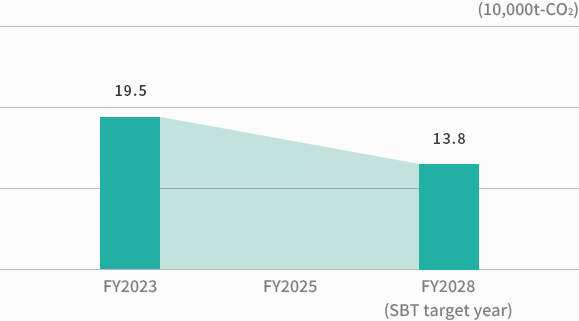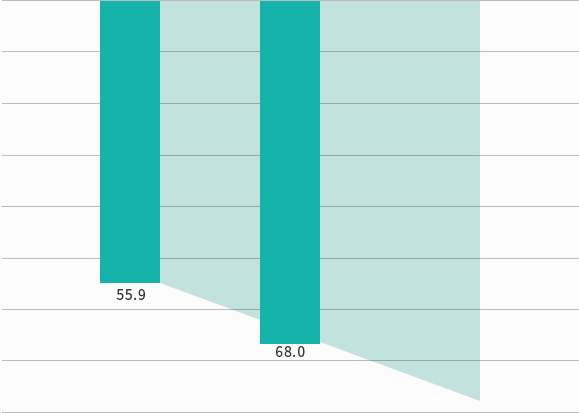Carbon neutrality
Basic approach to carbon neutrality
Since the Industrial Revolution, emissions of CO2 and other greenhouse gases have increased, resulting in global warming. Concerns exist that climate change accompanying global warming will have increasingly adverse effects on people's lives and on ecosystems, as seen in torrential rains, floods, and other natural disasters, decreases in food and water resources, and occurrences of extreme heat and infectious diseases outbreaks.
To mitigate the advance of climate change and effect a transition to a low-carbon society, the Paris Agreement was put into effect in 2016. This agreement sets a globally shared long-term target of holding the increase in global average temperature to well below 2°C (the "2°C target"), with efforts made to further limit the rise to 1.5°C.
The main business of the Daiseki Group is the intermediate treatment and recycling of industrial wastes generated by customers in Japan's manufacturing industry. Amid such movements in the international community, inadequate measures against global warming by Japan and a subsequent decline in the country's manufacturing industry would cause the Daiseki Group to lose its customer base. Therefore we recognize global warming as a major risk to our business. This is one of the reasons why the Daiseki Group supports the Paris Agreement.
Certification of greenhouse gas reduction targets by SBTi
In November 2022, the Daiseki Group obtained certification by the Science Based Targets (SBT) Initiative*1 based on the scientific grounding ("well below 1.5°C") of our greenhouse gas (GHG) reduction targets for 2030. Our targets are as follows:
- 1. Scope 1*2 + Scope 2*3
- : 34% reduction by FY2028 (compared to FY2022)
- 2.Scope 3*4
- : 20% reduction by FY2028 (compared to FY2022)
- 3. Switch to renewable electrical power
- Make a 100% switch to electrical power derived from renewable energy sources by FY2031
- *1 SBTi
- : SBTi is an international joint initiative established in 2015 by the CDP, the United Nations Global Compact, the World Resources Institute (WRI), and the World Wildlife Fund (WWF). It investigates and certifies whether targets to reduce GHG emissions set by a company for the purpose of achieving the target of the Paris Agreement (curbing the global temperature rise caused by climate change to 2°C above pre-industrial levels) are grounded in science.
- *2 Scope 1
- : Direct emissions associated with the use of fuels
- *3 Scope 2
- : Indirect emissions associated with the use of electrical power and heat purchased from outside sources
- *4 Scope 3
- : Indirect emissions other than Scope 1 and 2
Based on our environmental policy, the Daiseki Group makes active efforts to reduce greenhouse gas emissions from our business activities. Through the provision of recycled resources and the achievement of industrial waste treatment that emits lower volumes of greenhouse gases, we will contribute to the achievement of a low-carbon society by reducing greenhouse gases in society.
The Daiseki Group’s Medium- to long-term targets for greenhouse gas emissions reduction
-
Reduction targets for total emissions under SCOPES 1 and 2 (unit: 10,000t-CO2)

-
Reduction targets for total emissions under Scope 3 (10,000 tons of CO2)

*During the SBTi certification process, information on Scope 3 total emissions and on Scope 1+2 and Scope 3 reduction targets was revised.
FY2024 greenhouse gas emissions figures at the Daiseki Group
| Scope 1 Direct greenhouse gas emissions by the Daiseki Group (from energy sources only) |
Scope 2 Indirect emissions associated with the use of electricity, heat, and steam supplied by other companies (electricity only in the case of the Daiseki Group) |
Scope 3 Indirect emissions not covered by Scope 1 and 2 (other companies’ emissions related to the Daiseki Group's activities) |
|
|---|---|---|---|
| Emissions(tons of CO2) | 29,366 | 11,322 | 176,169 |
Setting net-zero target
The Daiseki Group set a net-zero target in FY2023 and disclosed it in its ESG Report 2022.
1. Scope 1+ Scope 2:100% reduction by FY2051
Initiatives at each step
The Daiseki Group is working to reduce greenhouse gases at every stage, from raw material procurement to disposal by consumers. We will continue to undertake initiatives aimed at achieving a low-carbon society.
Activities aimed at achieving a low-carbon society
| Activities aimed at achieving a low-carbon society | |
|---|---|
| Raw material procurement |
Collection of industrial waste
|
| Activities by our company |
Plants
Offices
|
| Collaboration with suppliers | In FY2023, we began collecting fuel consumption data of transportation vehicles from partner companies to which we outsource transportation, and began efforts to reduce Scope3 emissions. |
| Use by consumers | Reduction of GHG emissions associated with the use of recycled products manufactured and sold by our company as substitutes for fossil fuel-derived ones |
| Disposal by consumers | Reduction of greenhouse gas emissions at the time of disposal by manufacturing recycled products that generate little or no waste |
Greenhouse gas emissions and avoided emissions
Greenhouse gas emissions from Daiseki Group's business activities and our customers' avoided emissions of greenhouse gases using Daiseki's industrial waste processing without combustion are shown below. Avoided emissions represents the extent to which the in-house products and services have contributed to reducing emissions across the society as a whole. Daiseki can process industrial waste with less greenhouse gas emissions than incineration disposal. For example, customers entrusting Daiseki with recycling processing of waste oil, sludge, etc. can reduce the greenhouse gas emissions in Scope 3 when reporting to CDP or other environmental rating institutions since Scope 3, Category 5 (Waste generated in operations) emissions are zero*. Daiseki has set a target of achieving avoided emissions of at least 680,000 tons of CO2 by FY2025.
*The Database on Emissions Intensity for Accounting of Greenhouse Gas Emissions, etc., by Organizations Throughout the Supply Chain (Ver. 3.4), published by the Ministry of the Environment, sets the emissions intensity (quantity of greenhouse gas emissions per a given unit of activity) for recycling of waste oil and sludge to zero.
Greenhouse gas emissions from business activities
of the Daiseki Group
(Scope1+Scope2+Scope3)


CO2 avoided emissions from recycling business
of the Daiseki Group
(CO2 avoided emissions except for Scope1, 2, and 3)










